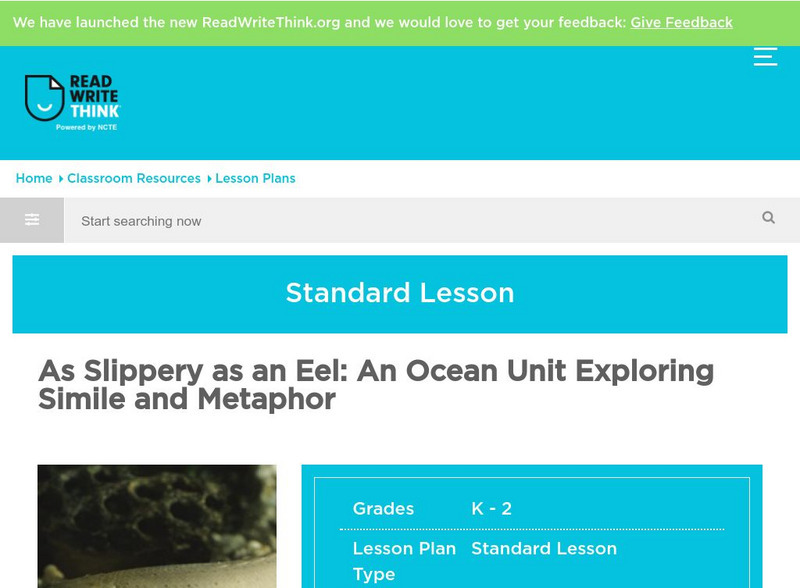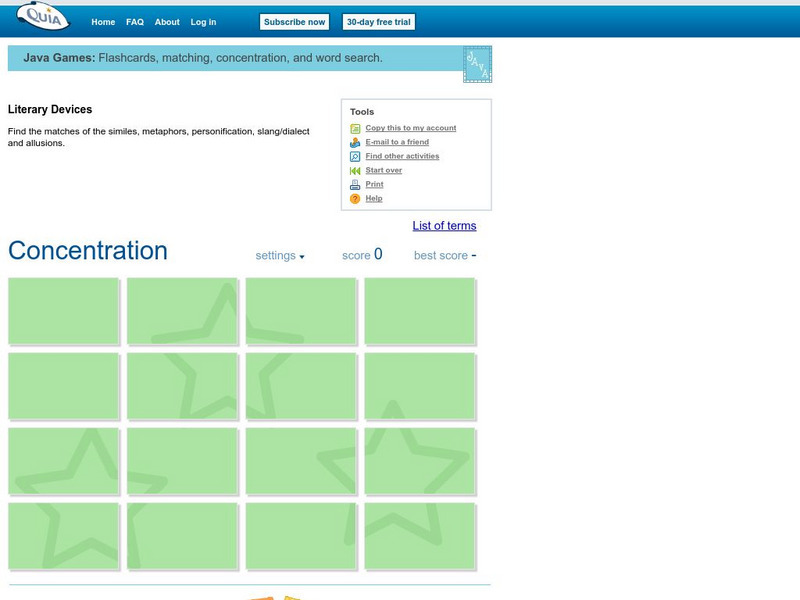Hi, what do you want to do?
Texas Education Agency
Texas Gateway: Imagery: Simile and Metaphor (English I Reading)
[Accessible by TX Educators. Free Registration/Login Required] Identify the similes and metaphors in a text and evaluate their importance to the meaning of the text. RL.9-10.5 text structure effects
Texas Education Agency
Texas Gateway: Simile and Metaphor
Explain the effect of similes and extended metaphors in literary text.
Read Works
Read Works: 4th Grade Lesson: Similes and Metaphors
[Free Registration/Login Required] A lesson in which students use the book Poetry for Young People: Langston Hughes edited by David Roessel and Arnold Rampersad to learn to identify and understand the use of simile and metaphor in...
McGraw Hill
Mc Graw Hill: Vocabulary Acquisition and Use: Understand Figurative Language
Explains what similes and metaphors are and how they are alike and different. Provides examples and practice sheets for each.
ReadWriteThink
Read Write Think: An Ocean Unit Exploring Simile and Metaphor
Contains plans for four lessons that teach students about similes and metaphors using ocean themed resources. In addition to objectives and standards, this instructional plan contains links to sites used in the lessons as well as...
CK-12 Foundation
Ck 12: 6.1 Writing About Literature: Analyzing Prose
[Free Registration/Login may be required to access all resource tools.] Learn to analyze prose by understanding connotation and denotation, identifying metaphors and similes, looking for repetition, and finding imagery in a text.
ReadWriteThink
Read Write Think: Figurative Language Awards Ceremony
Contains plans for five to seven lessons that teach about figurative language like similes, metaphors, and personification by asking students to write award acceptance speeches that incorporate them. In addition to objectives and...
Writing Fix
Writing Fix: How to Make Poetry
Students learn how to write poetry through ten Writing Workshop mini-lessons. Students complete the graphic organizers provided while learning to notice details, write similes and metaphors, and create patterns in their writing.
TES Global
Blendspace: Similes and Metaphors
An eighteen-part learning module with links to videos, charts, and images to teach similes and metaphors.
ClassFlow
Class Flow: Figurative Language
[Free Registration/Login Required] This resource explores figurative language including similes, metaphors, and personification. There are many activities used to support the exploration of each type of figurative language.
TES Global
Blendspace: Similes & Metaphors by Mrs. Wade
A six-part learning module with links to videos and websites about similes and metaphors.
Alabama Learning Exchange
Alex: Figurative Language
This lesson used a slideshow presentation to explain the difference between similes and metaphors. Students are challenged to identify these figurative elements in literature and then create some themselves.
Quia
Quia: Concentration: Literary Devices
This game asks students to match literary devices (similes, metaphors, personification, slang/dialect and allusions) with their examples while remembering where they are located behind covered squares. Java is required.
TES Global
Tes: Teaching Shakespeare: Sonnet 130 Year 7
[Free Registration/Login Required] This lesson plan for Shakespeare's "Sonnet 130" asks students to mark the rhyme scheme and highlight similes and metaphors, to respond to a modern letter with a message similar to the sonnet, and to...
E Reading Worksheets
E Reading Worksheets: Figurative Language Worksheets
This learning module provides remediation and extra practice with identifying different types of figurative language. Reinforcement is provided through the worksheets, quizzes, video game links, and online sites for the following types...
E Reading Worksheets
E Reading Worksheets: Figurative Language Examples
Along with definitions for four types of figurative language, this learning module provides numerous examples. Similes, metaphors, personification, and hyperbole are the types of figurative language featured.
E Reading Worksheets
E Reading Worksheets: Figurative Language: Reading Test 3
A ten-question quiz on recognizing similes, metaphors, hyperbole, and personification. Results can be printed, saved, or emailed.
TES Global
Blendspace: Figurative Language & Tone
A twelve-part learning module with links to texts, videos, and websites on figurative language and tone.
Love To Know Media
Your Dictionary: Literary Terms Lesson Plan
This is a lesson plan for teaching the seven literary terms used in poetry: simile, metaphor, alliteration, imagery, hyperbole, personification, and onomatopoeia.
Read Works
Read Works: 3rd Grade Lesson: Poetry
[Free Registration/Login Required] A lesson in which students use two provided poems to learn to identify and understand the use of similes and metaphors in poetry. Lesson includes direct teaching, guided practice, and independent...
Houghton Mifflin Harcourt
Houghton Mifflin: Teacher's Guide to "The Polar Express" [Pdf]
This teachers' guide for "The Polar Express" by Chris Van Allsburg has lessons designed for both early elementary and intermediate students. It includes working with a timeline and learning about similes and metaphors. (In PDF format.)
Other popular searches
- Similes and Metaphors
- Poetry Similes and Metaphors
- Metaphors and Similes Test
- Using Similes and Metaphors
- Autumn Metaphors and Similes
- Similes and Metaphors Poem
- Poems Similes and Metaphors
- Lyrics Metaphors and Similes
- Writing Similes and Metaphors






















